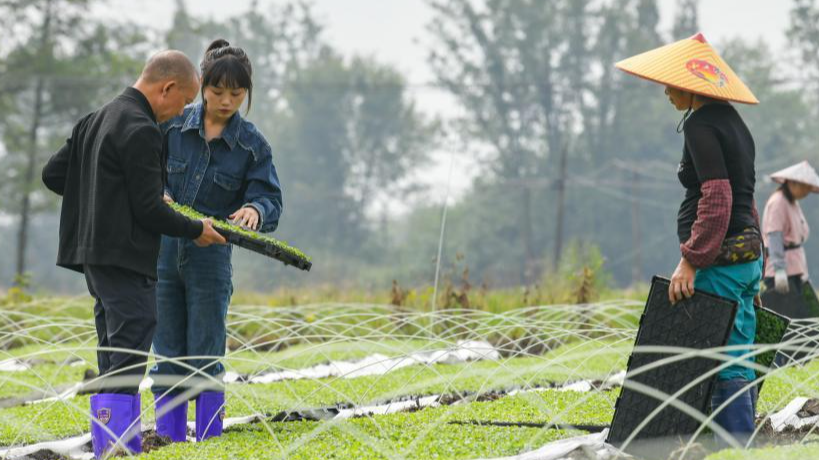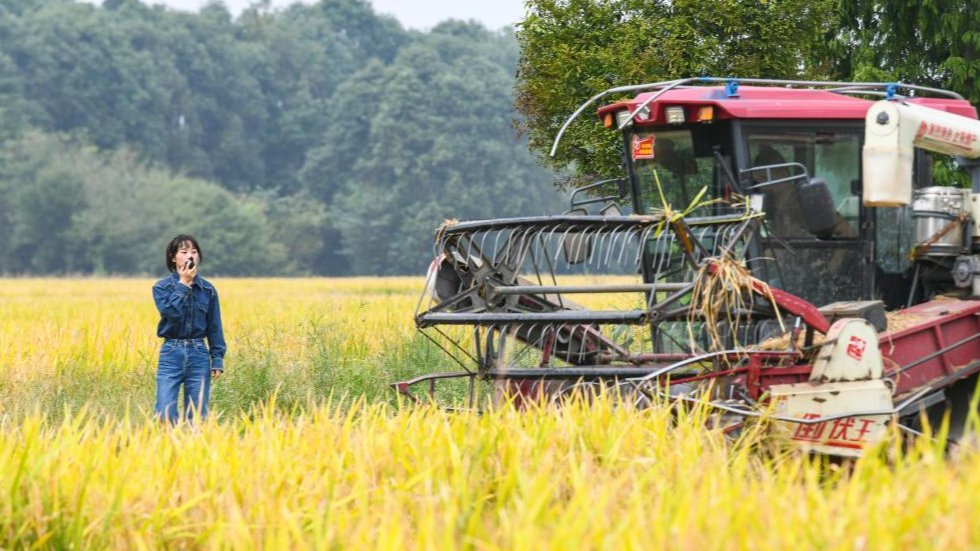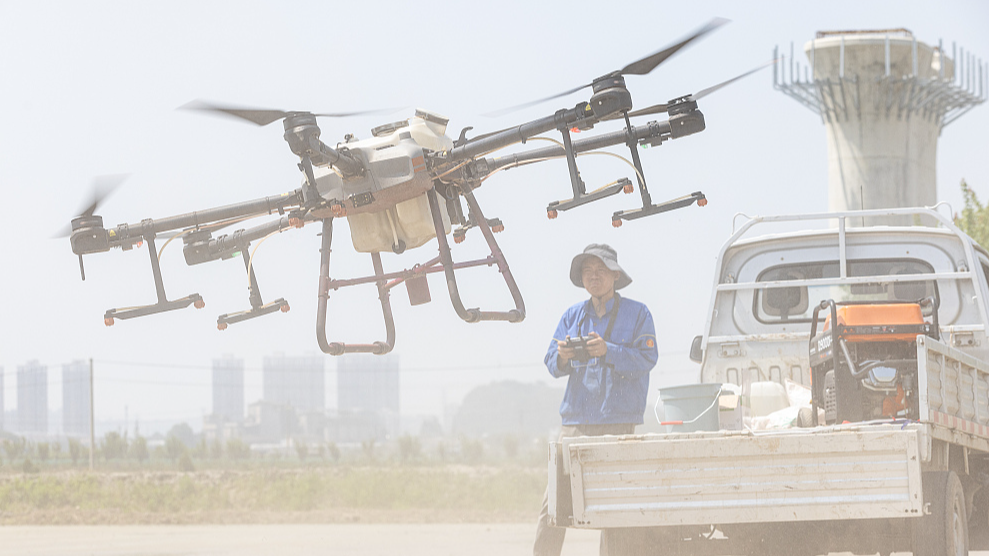
Wang Lingli talks with other farmers about the cultivation of seedlings in a farm land in Chongzhou City, southwest China's Sichuan Province, October 10, 2023. /Xinhua
Wang Lingli talks with other farmers about the cultivation of seedlings in a farm land in Chongzhou City, southwest China's Sichuan Province, October 10, 2023. /Xinhua
Editor's note: China will hold its annual "Two Sessions" in early March. Ahead of this year's key annual political meetings, CGTN presents "A look at China during the Two Sessions," a special series that takes an in-depth look at the country's endeavors in promoting people's livelihood, rural revitalization, economic development, sci-tech innovation and opening up.
Born in the 90s in southwest China's Sichuan Province, Wang Lingli never thought that she will get engaged in farming. But she is now an experienced farm manager who runs four farm cooperatives with a collective land area of 6,500 mu (about 433 hectares). It has not been an easy road for Wang who started with only one cooperative and a land area of 3,000 mu (200 hectares).
Following in the footsteps of her father – one of the first farm managers in Chongzhou City, southwest China's Sichuan Province – Wang chose to become a farm manager after graduating from university in 2015.
"I just want to plant well and realize my own value in the process of farming," Wang said. What makes her different from her father or other farmers is her idea of boosting farming efficiency by using advanced machinery and technology.
In her cooperatives, more than 40 sets of large machinery, including rice transplanters, help realize a fully mechanized operation from sowing and transplanting to harvesting and drying. Thanks to the machines, only 20 people now work on the 6,500 mu of land during the busiest time.
Wang also put more emphasis on improving seedling growth rate and cultivating new and high-quality varieties to increase the grain's value. Taking one kind of well-sold rice as an example, Wang said each kilogram of rice is sold at the price of nearly 3.2 yuan (nearly $0.4), which is 0.6 yuan higher than regular purchase price.
Her efforts have paid off. In 2023, Wang's cooperatives witnessed a yield increase of 25 kilograms per mu, farmers began earning over 5,000 yuan a month during busy periods, and machinery operators can now make 300 to 400 yuan a day.

Wang Lingli talks with driver of a harvester in a farm land in Chongzhou City, southwest China's Sichuan Province, October 10, 2023. /Xinhua
Wang Lingli talks with driver of a harvester in a farm land in Chongzhou City, southwest China's Sichuan Province, October 10, 2023. /Xinhua
Modern farming meets tech-savvy farmers
Farm managers like Wang are also called "new farmers," who are mostly well-educated young people with new ideas and skills and find more job opportunities by moving from big cities to the countryside.
Addressing challenges with innovative solutions, these "new farmers" have become an important force in promoting rural revitalization in recent years. Figures from the Ministry of Agriculture and Rural Affairs show that by the end of 2020, about 10 million people had returned home for rural entrepreneurship, and the number is estimated to exceed 15 million by 2025.
The tide coincides with China consolidating its poverty alleviation achievements and initiating the rural revitalization drive after lifting the last 98.99 million impoverished rural residents out of poverty in 2020.
Due to rapid scientific and technological developments, the mode of agricultural production is constantly transforming to a modernized one, featuring application of advanced technology and management instead of the traditional mode of relying heavily on physical labor.
The modern farming attracts tech-savvy new farmers and provides them opportunities to play a major role in the country's rural revitalization drive. Wang is one of them.
"In the future, I will continue to focus on local agricultural production, hoping to grow higher quality grain through developing quality varieties and utilizing good technology and machinery, thus further increasing the income of workers at the cooperatives," Wang said.
Data from the Ministry of Agriculture and Rural Affairs shows that the contribution rate of China's agricultural science and technology progress reached 62.4 percent in 2022.
The 2023 Government Work Report also detailed the country's effort in accelerating the pace of innovation in seed technology and agricultural machinery. The rate of mechanization in crops plowing, planting and harvesting increased from 67 percent in 2018 to 73 percent in 2022, said the report.

A young farmer operates a drone in a farm land in Huzhou City, east China's Zhejiang Province, June 17, 2022. /CFP
A young farmer operates a drone in a farm land in Huzhou City, east China's Zhejiang Province, June 17, 2022. /CFP
The challenges
Earlier this month, China unveiled its "No.1 central document" for 2024, outlining the priorities for comprehensively promoting rural revitalization this year. The document not only calls for efforts to strengthen the role of sci-tech development in promoting rural revitalization, but also stresses the importance of attracting and training talents for rural revitalization.
The document's highlight on rural and agricultural talent has won support from new farmers like Wang. However, it's easier said than done. Wang said her cooperatives are short of talents, especially professional farmers.
Admitting she could hire some rural talents, Wang singled out one question: Where can these talents stay? Because most farm cooperatives do not provide housing for their staff workers as nearly all of them sleep at their homes.
Wang is not alone. Huang Li, a loquat tea grower in Chongzhou, also has difficulty in hiring talents in product development and marketing. Huang said that most of the staff workers at her tea cooperative are her family members or relatives.
Due to the relatively poor rural infrastructure and lack of rural talents, Hang said she is still waiting for time to build a tea workshop next to the tea garden or develop some sightseeing programs.
Song Qing, a member of the Chinese People's Political Consultative Conference based in east China's Suzhou City, shares the concern with the shortage of talents in the process of agricultural and rural modernization. Song said the quantity and quality of rural talents need to be improved after conducting field research on farm cooperatives in Suzhou City.
Noting the stock of rural human resources is insufficient and the increment is reduced, Song said the number of new farmers is still relatively small in the face of the important mission of rural revitalization.
In this regard, Song suggested promoting the training of public agricultural students and cultivating new farmers in multiple dimensions.




